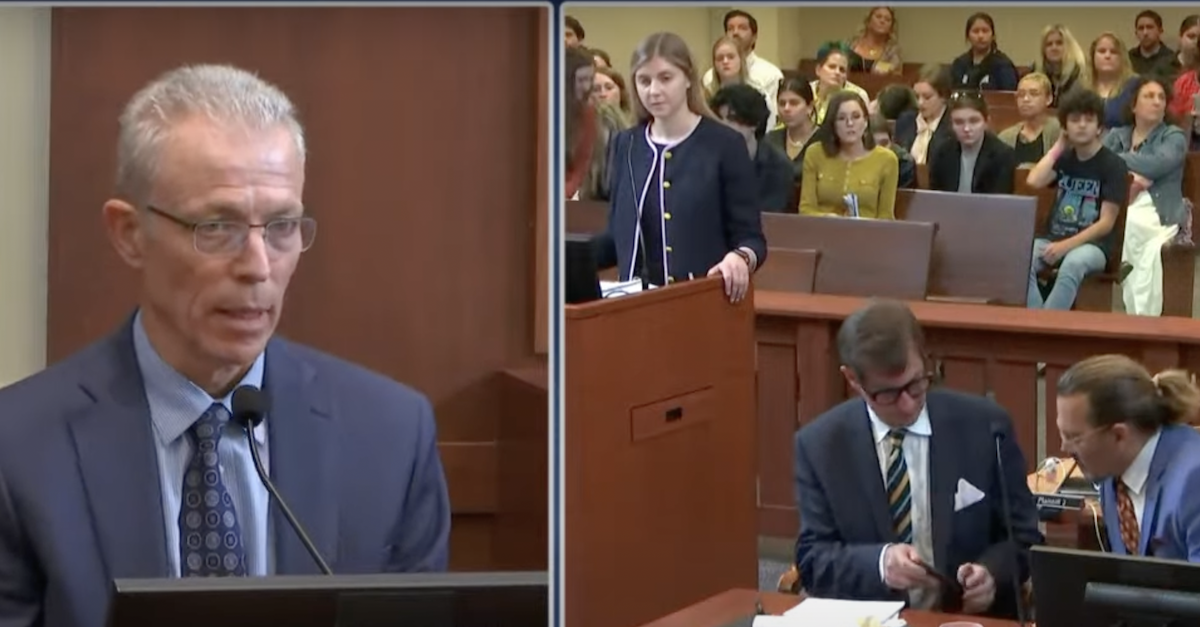
Psychiatrist Richard Shaw testifies as a rebuttal expert in the Johnny Depp-Amber Heard trial. (screenshot from Law & Crime Network)
Vanessa Bryant’s lawyers have hired the psychiatrist who testified as an expert for Johnny Depp as they try to refute Los Angeles County’s argument that she hasn’t been harmed by the illicit photos first responders took of the remains of her husband, basketball legend Kobe Bryant, and their daughter Gianna Bryant.
In a final move before jury selection begins Aug. 10, Bryant’s legal team filed notice Tuesday at 12:30 a.m. that Richard John Shaw, a forensic psychiatrist and a professor at Stanford University, will testify as a rebuttal witness after LA County’s defense lawyers rest their case.
Shaw’s involvement follows U.S. District Judge John F. Walter’s rejection of Bryant’s lawyers’ bid to bar testimony from Marc A. Cohen, a psychiatrist and UCLA professor who reported he “found no evidence that Vanessa Bryant has been mentally harmed or emotionally damaged from crash-scene photographs of her late husband and daughter being shared.”
“The source of Vanessa Bryant’s distress lies in what she imagines the photographs depict and the fear she has about such images being publicly disclosed,” Cohen said, as cited in court documents.
Judge Walter agreed LA County’s lawyers disclosed Cohen’s report after a court deadline, but he said the doctor’s testimony will still be allowed so long as Bryant’s attorneys were able to take his deposition at the defense’s expense, which was to occur last week. The judge also allowed Bryant’s attorneys to put on a rebuttal expert, setting the stage for Shaw’s last-minute appearance.
The 21-page report Bryant’s lawyers obtained Monday from Shaw, filed with the notice early Tuesday, disputes Cohen’s findings and methodology. It concludes “it is possible that a person could suffer significant distress and anxiety, potentially for the rest of his or her life, from learning that his or her loved ones’ mutilated remains were photographed by multiple first responders for personal use…”
A veteran expert witness who said he’s testified in about 50 depositions and trials in 15 t0 20 years, British-born Shaw drew broad coverage in May for his rebuttal testimony on behalf of Depp in the trial over Depp’s defamation lawsuit against Amber Heard and Heard’s countersuit.
Depp’s lawyers at Brown Rudnick LLP hired Shaw to rebut testimony from his Stanford colleague David Spiegel, a fellow psychiatrist who testified that alcohol and drug abuse impaired Depp’s cognitive processing speeds.
In his approximately 50 minutes on the stand, Shaw said Spiegel “violated the ethical principals” established in an American Psychiatric Association’s so-called “Goldwater rule,” that deems it improper to express an opinion about someone without personally evaluating them. That principle gets its name from former Republican politician Barry Goldwater, whose landslide defeat in the 1964 presidential election was preceded by a magazine article polling mental health providers claiming — without clinically observing him — that he was unfit to serve. As the APA ultimately said of Goldwater’s armchair clinical observers, Shaw said Spiegel’s opinions were “unreliable” and that Spiegel had “insufficient information” on which to base them.
As he did in the Depp-Heard trial, Shaw will be testifying in the Bryant trial about a psychiatric report written by someone who didn’t personally evaluate their subject.
Bryant’s motion to exclude Cohen’s testimony says Cohen’s “efforts to offer a psychiatric evaluation of a person he has never examined are prohibited as unethical by his profession, entirely speculative, and without any proper basis in fact or in the approved methods of his field.”
But, as one of Heard’s lawyers implied in his brief cross-examination of Shaw on May 24, no expert has ever been excluded from testifying in court because of the Goldwater Rule. Bryant’s lawyers seemed to acknowledge as much when they asked Judge Walter to exclude Cohen’s testimony not for ethical violations by him but for court deadline violations by the county’s lawyers.
In a hearing last week, Walter said he’s allowed to accept reports after deadline if the missed deadline was harmless, which the judge said it would have been had Bryant’s lawyers not refused LA County’s offer to depose Cohen.
As Heard’s lawyer did in his cross-examination of Shaw, Walter dismissed the Goldwater Rule as being largely irrelevant to the case, saying it didn’t apply to court testimony.
The judge said Cohen reviewed 8,000 pages of material, watched hours of recorded testimony and reviewed 23 scientific articles when evaluating Bryant. He also said Cohen’s own acknowledgement “of the limitations of his reports,” including that he didn’t personally meet with Bryant or the plaintiff, Christopher Chester, “will give plaintiffs strong ammunition during cross examination of Dr. Cohen.”
Walter also cautioned LA County lawyers, “It seems to me that this Dr. Cohen testimony could well backfire, but I’ll leave that to you.”
The lawsuit from Chester, whose wife, Sarah George Chester, and daughter, Payton, died in the Jan. 26, 2020, helicopter crash, was combined with Bryant’s for trial. Two similar lawsuits from the families of crash victims Christina Mauser and John, Keri and Alyssa Altobelli settled in November 2021 for $1.25 million each.
Cohen’s trial testimony is key for defense attorneys trying to refute argument from Bryant’s lawyers that LA County should pay to compensate her for emotional distress she suffers because of the photos and her fear that they could publicly surface.
None have, but her lawyers have deposition testimony and phone records that indicate they were shared by firefighters and sheriff’s deputies several times, including to people in states outside California through the Fortnite video game.
As an evidentiary sanction, Judge Walter also is allowing them to question witnesses about the deletion of the photos and the decisions surrounding it, and jurors will be specifically instructed that they can consider the testimony when deciding liability. The issue could aid Bryant’s lawyers as they argue for punitive damages, though caselaw is well established that punitive can’t exceed 10 times compensatory.
(Image: screenshot from Law & Crime Network)